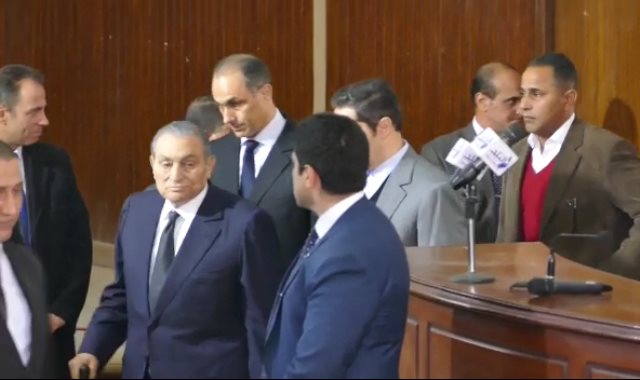Egyptian security forces on Tuesday arrested the nephew of Osama al-Ghazali Harb, president of the opposition Democratic Front Party (DFP), at Cairo International Airport, according to a press release issued by the Arabic Network for Human Rights Information (ANHRI).
Harb believes the arrest may be attributable to his nephew’s closeness to activists involved with an informal presidential campaign in support of Egyptian intelligence chief Omar Suleiman.
According to the ANHRI statement, a certain security agency–which does not report to the Interior Ministry–“kidnapped” DFP activist Shadi Tarek al-Ghazali at 7:00 AM on Tuesday.
Tarek al-Ghazali had been booked on a British Airways flight to London, where he had planned to take his PhD fellowship exam in surgery at a British university, when he was arrested and "taken to an unknown location," the Cairo-based rights group said.
The ANHRI statement added that "the repeated disappearances of activists in recent days, without comment from the Interior Ministry and with the prosecution declining to respond to calls to investigate those responsible, leads us to believe that a security body higher than the state security apparatus stands behind the activists’ disappearance."
The statement, however, did not explicitly identify the “security body” in question, merely noting that it had been impossible to obtain an explanation from the Interior Ministry.
The activist’s father, Tarek al-Ghazali Harb, said he had contacted airport security in an effort to find out what had happened, but had not received a reply. A British Airways official, he said, had informed him that his son’s trip had been canceled 15 minutes before his scheduled departure.
The activist’s father went on to explain that his son had relinquished his membership in the DFP in order to study and work in the UK. He plans to file a request with the attorney-general for an explanation for his son’s disappearance.
DFP President Osama al-Ghazali Harb, for his part, said his nephew had most probably been arrested by the state security service. He added that his nephew was a friend of Amr Salah and Ahmed Eid, two DFP members who support an Omar Suleiman presidency and oppose the presidential ambitions of Gamal Mubarak, son of President Hosni Mubarak.
Salah and Eid were both arrested six days ago and released two days later.
In its statement, the ANHRI expressed its "deep concern over the repeated disappearance of Egyptian citizens under mysterious circumstances." It called on the Egyptian government “to clearly state its reasons for arresting those calling for democratic reform, to explain why they had been illegally detained, and to disclose who was behind the arrests, so that Egyptian citizens were not illegally penalized for practicing their legitimate rights to expression and participation."
On 2 September, an unknown group hung posters around Cairo endorsing Suleiman as a presidential candidate in elections scheduled for late next year. The posters refer to the intelligence chief as a "real alternative."
The “Popular Campaign to Support Omar Suleiman for President” was viewed by some analysts as a jab at President Mubarak, Egypt's leader for nearly 30 years.
Some believe Mubarak is grooming his son Gamal, a banker-turned-politician, for the presidency.
Egypt’s opposition bitterly opposes a Gamal Mubarak presidency and has suggested a handful of alternative candidates, including Suleiman, former UN nuclear agency chief Mohamed ElBaradei, and Arab League Secretary-General Amr Moussa.
Suleiman, 74, is Egypt’s longest serving intelligence head. Appointed to the post in 1993–after two years serving as military intelligence director–Suleiman is entrusted with overseeing Egypt’s most important foreign policy files, including Israeli-Palestinian peace talks, Sudan, Iraq, and the United States.
The intelligence czar has recently been seen as a possible successor to the elder Mubarak, partially due to his rising public profile as a mediator between Israel and Palestinian factions, but mostly for his military background. Since Egypt ‘s 1952 military coup, all four of the country’s presidents have hailed from the army.
A Suleiman presidential candidacy may even garner support from within opposition circles. In 2005, Abdel Halim Qandil, a founder of the pro-democracy Kefaya movement, endorsed Suleiman as “a perfect choice” for president.
Egyptian military figures are seen by much of Egyptian society as “uncorruptable,” “patriotic” and “professional.” Civil Aviation Minister Ahmed Shafik, who once headed the Egyptian Air Force, has also been put forward as a potential presidential contender.
In May, Mubarak declared “only God knows” who would succeed him.
The president has not yet announced whether or not he planned to run for a sixth term.
In 2005 presidential elections, the first multi-candidate race in Egypt’s modern history, Mubarak did not announce his candidacy until only two months before the vote.
According to the Egyptian Constitution, independent candidates must enjoy the support of at least 250 members of the country’s elected bodies to be eligible to run for president–a condition that is virtually unattainable for any of Egypt’s opposition movements, including the Muslim Brotherhood.
Constitutional amendments made in 2007 further mandated that any potential presidential candidate must be a leading member of a legal political party for at least one year. This stipulation technically disqualifies military officers, since the ruling National Democratic Party (NDP)’s highest executive body does not include any recently retired army officers.
Opposition figures have repeatedly called on Mubarak to appoint a vice-president to reduce the chances of a power struggle within the ruling elite. But Mubarak, the longest-serving Egyptian president since national independence, has routinely contended that the constitution provided for the “safe” transfer of executive power.
The liberal DFP was founded in 2007 by Harb, who served as a member of the NDP’s Policies Secretariat–chaired by Gamal Mubarak–before resigning on the grounds that the party had failed to implement genuine political reform.



